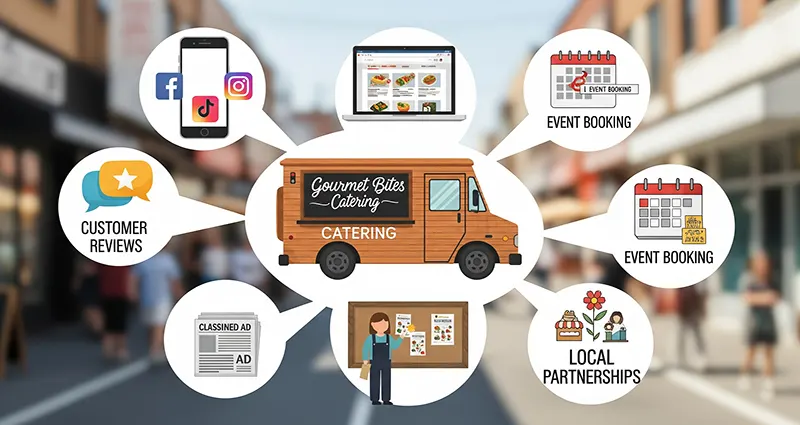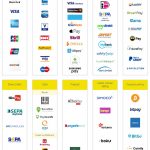In the highly competitive world of food service, a small catering business faces a unique challenge. Unlike a traditional restaurant with a fixed location, a caterer doesn’t have a storefront to draw in walk-in traffic. Your reputation and your next client are built almost entirely on your ability to market your services effectively. With a smart, multi-pronged strategy, even a small operation can stand out, build a loyal clientele, and turn a passion for food into a profitable business.
1. Build an Irresistible Online Presence
In today’s digital-first world, your online presence is your storefront, portfolio, and sales team all rolled into one.
- A Professional Website is Your Home Base: Your website should be more than a digital brochure; it should be a powerful sales tool.
- Showcase Your Menu: Clearly display your menu offerings, pricing, and package options. Use stunning, professional photographs to make your food the star.
- Highlight Your Unique Selling Proposition (USP): What makes you different? Do you specialize in corporate lunches, elegant weddings, or a specific cuisine like vegan or farm-to-table? Your website should clearly communicate your niche and what sets you apart.
- Feature Testimonials and Reviews: Social proof is incredibly powerful. Dedicate a prominent section of your website to glowing reviews from past clients.
- SEO is Key: Optimize your website with keywords that your target audience would use to find you (e.g., “corporate catering [Your City],” “wedding caterer [Your City]”).
- Dominate Social Media with Visuals: Catering is a highly visual business. Platforms like Instagram, Facebook, and Pinterest are your best friends.
- Post High-Quality Photos and Videos: Share mouth-watering pictures of your dishes, behind-the-scenes content of your team in action, and professionally styled shots of your event setups.
- Engage with Your Audience: Respond to comments and messages promptly. Run polls or Q&As to understand your followers’ needs and preferences.
- Showcase Your Events: Create posts or “Reels” from recent events to demonstrate the quality of your food and presentation in a real-world setting.
2. Network and Build Strategic Partnerships
Catering is a business built on relationships. Your best leads often come from other professionals in the events industry.
- Partner with Local Businesses: Establish relationships with wedding planners, event venues, florists, photographers, and even local breweries or wineries. These professionals are often the first point of contact for clients and can become a consistent source of referrals. Consider offering a referral bonus or a package deal for their clients.
- Attend Trade Shows and Networking Events: Get out from behind the stove and meet people face-to-face. Participate in bridal shows, corporate expos, and local business networking events. Bring samples of your best dishes to give potential clients a taste of what you can do.
- Leverage Community Involvement: Get involved in your local community. Offer to cater a local charity event, sponsor a school function, or host a small tasting for community leaders. This not only generates goodwill but also gets your food in front of a new audience.
3. Cultivate Word-of-Mouth and Referrals
Happy customers are your most effective marketing tool. Their endorsements carry more weight than any advertisement.
- Provide a Flawless Experience: Go above and beyond for every client, every time. From the initial consultation to the final cleanup, make the process seamless and stress-free. Exceptional service will lead to positive word-of-mouth.
- Implement a Referral Program: Create a formal program that rewards clients who refer new business. Offer a discount on their next order, a gift card, or a complimentary add-on for their successful referral.
- Proactively Ask for Reviews: Don’t be shy about asking for reviews. Send a follow-up email after every event thanking the client and kindly asking them to leave a review on Google, Yelp, or your social media pages.
4. Think Beyond the Digital Sphere
While digital marketing is essential, traditional tactics still have a place in your strategy.
- Physical Marketing Materials: Have professional-looking brochures, business cards, and menus that you can leave with potential partners and at networking events.
- Branding on the Go: Your catering vehicle, if you have one, is a moving billboard. Get it professionally wrapped with your logo, contact information, and website.
- Host Tasting Events: Invite potential clients to an exclusive tasting event. This allows them to sample your food, see your presentation style, and meet you in person. It’s an effective way to close a deal and build trust.
By combining a strong online presence with strategic networking and a commitment to customer satisfaction, a small catering business can overcome its initial challenges and build a reputation that keeps the orders—and the referrals—coming in. Your food may be your passion, but smart marketing is the recipe for turning that passion into a thriving business.










